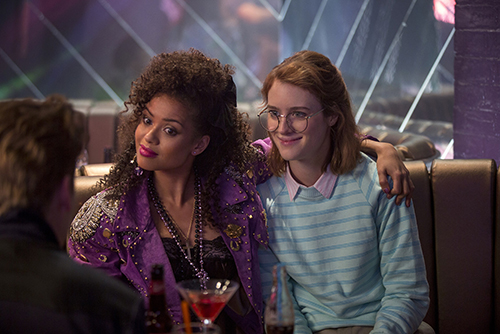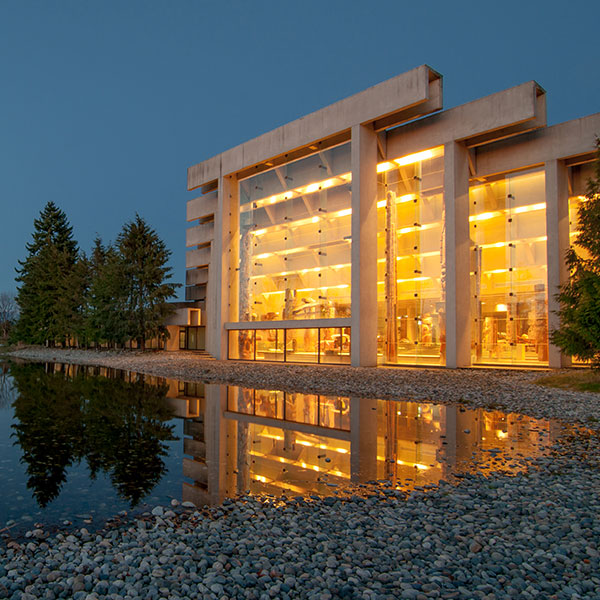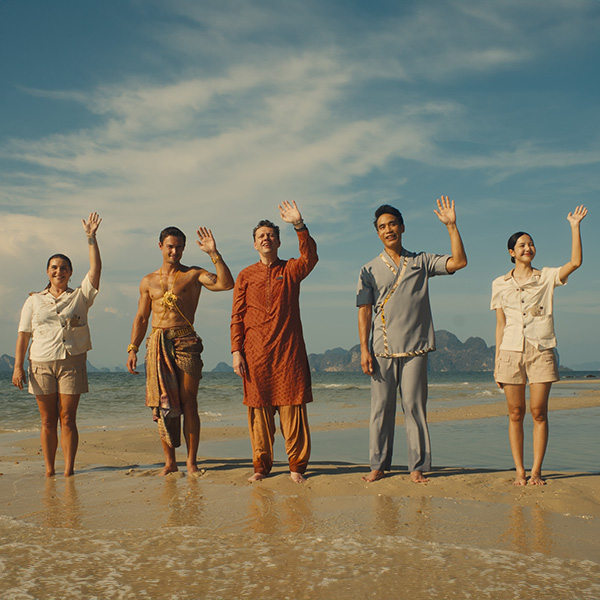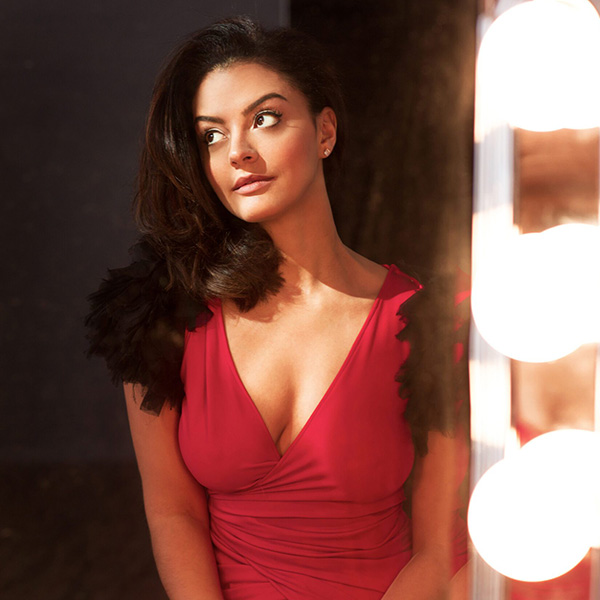The world is having a Mackenzie Davis moment. The Vancouver-born actress seems to be everywhere right now.
She was at the Emmy Awards last week, when “San Junipero,” the inventive and acclaimed episode of Black Mirror that she starred in, won two big prizes, including Outstanding Television Movie. “San Junipero” has quickly become a cult classic, especially with members of the LGBTQ community, who have long complained about how queer romances are portrayed in films and on television (too often in a tragic context, for one thing).
She is currently starring in the critically acclaimed TV series Halt and Catch Fire, now in its final season, as Cameron Howe, a young programming prodigy who becomes a pioneering force in the tech and gaming industries.
And, soon, she’ll be on the big screen in one of the most hotly-anticipated films of 2017 – Denis Villeneuve’s blockbuster sequel to Ridley Scott’s iconic Blade Runner.
Some of her first acting roles took place at McGill. Davis, BA’10, who did a degree in English literature at McGill (with a minor in women’s studies), recently spoke to the McGill News about Black Mirror, Blade Runner, bagels, and bone art (avoid that last topic if you ever run into her).
You were quite active in the theatre scene at McGill. You were in Player’s Theatre productions and Tuesday Night Café productions.
I was always [serious about acting], but I knew I wanted to get my degree first and I didn’t want to get my degree in acting. It was always something that I kind of did privately – it was a secret part of my life. I loved being in plays at McGill. I was in How I Learned to Drive with my friend Bob Lamont and it was one of the best experiences of my life. There’s nothing like putting together a play with a group of people. It’s so rewarding and such a rigorous thing to do.
Are there benefits to a degree in English for an actor? Is there something from those years that you draw on now?
I think any degree or foundational knowledge that’s not just about how to pretend to be other people is going to be helpful. Every single event is viewed through storytelling, so [studying literature] is a great way to learn about the world and to learn to have empathy for different people’s experiences in the world, which I think is the most important part of being an actor or just a functioning human being.
It also helped when I was doing what’s called generals. That’s where you go and meet people in LA and New York and there is no specific acting job on the line. You’re introducing yourself to casting directors and I guess you’re trying to charm people. It can be tough to figure out what to talk about. I was able to say, “Hey, I read this book and what did you think of it?” Instead of just, “I’m an actress. Hire me!”
Did you have any favourite Montreal haunts back in those days?
I was a big Schwartz’s gal. We all went to Fairmount for bagels. But mostly, we just had house parties or we made dinner with friends. That was more my life than going to bars. My friend is working [in Montreal] right now and I felt bad because I had no ideas for where she should go. The house I used to live in? The houses where my friends used to live? That’s where I spent my time.
I saw you at the Emmy Awards last week. I imagine that was a pretty good Sunday for you.
That was so cool! We were all just so excited to be there that the idea of winning hadn’t become a thing that even existed as a potential outcome. Gugu [“San Junipero” co-star Gugu Mbatha-Raw] and I were sitting next to each other and holding hands. It was so unexpected and I was blown away by it. Yes, it was a great Sunday.

Did you have any inkling that “San Junipero” would have such an impact when you were making it?
Black Mirror at the time was culty television. When I first saw it, it was pirated off the Internet and we watched it in a friend’s basement under the cloak of night [laughs]. I was so excited to do [the episode] because I was such a big fan of the show. This past year [the show] blew up, because it received such a wide release with Netflix. You agree to do things because they move you. I just loved that love story. It’s nice when the things that move you and that you think are important also resonate with other people.
The fourth and final season of Halt and Catch Fire is airing on AMC right now. That show has been a big part of your life for the past few years. Do you have any thoughts on how you hope it will be remembered?
I just hope that people continue to discover it. It’s almost a running joke that it’s this secret show that airs on Saturday nights that nobody really knows about except the people who love it – and those people love it so passionately. I think it’s a beautiful story. It’s a story about people’s minds and their ambitions and their desire to change the world. There’s not a lot of sex and not a lot of violence. I’m really proud to be a part of something that treats the mind and entrepreneurship in a way that’s inherently dramatic.
You’ve been in several films, but Cameron presented you with an opportunity to develop a character over a long period. In other interviews, you’ve talked about how Halt and Catch Fire was one of your first big roles and you were a little nervous at the start. Cameron gets recruited to work in the tech industry while she was still in college when we first meet her. You kind of grew up together.
I was older than Cameron when I started [on the show] and younger than her when we finished, but I feel like I really went through her whole twenties with her. I felt so intimidated [at the beginning of the show], being thrust into this new world the way she was too – there were a lot of similarities. I do feel like I grew up with her.
Is it difficult to say goodbye to a character that has been in your life for so long?
I think if they had ended the show differently, it might have been harder to say goodbye. I’m so satisfied by the ending. It’s not what I would have pitched, or what was in my mind, and yet it’s so much better than what I would have pitched. I feel like, “It’s okay. She’s safe, she’s fine.” I can imagine the next phase in their lives and I’m glad to see them get some peace.
We’ll soon be seeing you in Blade Runner 2049. It sounds like you were a big fan of the original Blade Runner.
I saw it for the first time when I was still in Montreal. I am so in love with that movie and that world. I thought it was just a perfectly executed piece of art. I never stopped wanting to be a part of it and somehow that came true. I love science fiction. I love these [films] that ask questions about what it is to be a human and how does a person love and how do you define the weight and importance of a life – but couched in this fantastic, gorgeous, completely thought-out universe.
Is there anything you’re allowed to say about the character you’re playing? It’s all pretty hush-hush so far.
It’s all just so boring, the half-things that I have to say [laughs]. We just did a full two days of junkets and you just have to talk around it. I guess there’s a skill to not saying that much and I’m not sure I have it. I can say this: I play a character who comes into the life of Officer K, who is played by Ryan Gosling, and she’s very intrigued by him from the beginning.
As many women are.
A lot of men are fascinated by Ryan too. People are generally fascinated by Ryan.
I understand that you came back to Montreal to have lunch with Denis Villeneuve while he was still planning the film and before you were cast. What was that like?
It was surreal. The first thing I did was go to Fairmount to get a bunch of bagels to bring back to New York with me. We had a lovely lunch, but everything was so preliminary at the time. We talked about how we both loved the first film. There’s a lot of talking near a thing, but not directly about the thing, when you’re talking about a movie that’s this secretive. I didn’t read a script until I was offered a role in the movie and then I got to read the script and see what the role would be and by then I was desperate to be in it.
In other interviews, you seem a little wary of some of the things that are associated with being a celebrity. What kind of career would you like to have and how do you think you’ll be able to balance that with having some degree of normalcy in your life?
I think you make that calculation with every role that you take on. I think there is some control you have over it. The bigger the film you’re going to do, the more of an imposition it’s going to be on your private life. But it also gives you access to roles that might be out of reach if you hadn’t done that big movie. It’s kind of a crapshoot. Some of my friends have done some of the biggest movies in the world and they’ve managed to have this completely private life. They’re not at all burdened by the stress of being in those movies that you see other people being burdened by. I think you just make the things that you think are important to make, for the least cynical reasons you can think of, and hopefully it all makes sense to you in the end, the life that you have.
What’s the most annoying question that you get asked in interviews?
There was a time when I disclosed that I made these weird bone animal [pieces of art]. And I get it – maybe I shouldn’t have mentioned it if I didn’t want to get asked about it. It was a quirky thing for me to be doing. I swear to God, for the next four years, the only question that I got asked in every interview was about these things. It makes you not want to reveal anything about yourself. I don’t think it’s that interesting and I don’t want it to be the one thing that defines me.
I’m glad I didn’t know about that. And that I didn’t lead off this interview with a question about it.
[Laughs] Well, I wouldn’t have said anything if you did, because that would have been very rude.


